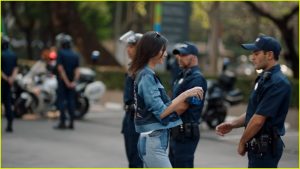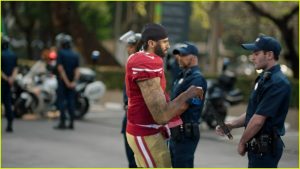
The original photo is a snapshot taken from Pepsi’s 2017 commercial centered around model Kendall Jenner. It is considered an activist based commercial as it follows a group of peaceful protesters walking down the street, signs in hand, ultimately ending in that above photo of Jenner handing a can of pepsi to a police officer. The officer gladly takes the pepsi and smiles to his partner as the protest continues happily.
After receiving a storm of backlash, Pepsi was forced too pull the ad and stated they had “clearly missed the mark” (Pespsico, 2017). It is almost impossible to comprehend how such a large corporation was capable of ignorantly making light of social and political issues of race, police brutality and peaceful protest. Pepsi missed more than merely “the mark” as they trivialized the continuous struggle particularly of people of colour.
The photo depicts a white economically affluent young woman engaged in a peaceful interaction with riot police by giving away a pepsi can. Both historically and in present time, protesters have found themselves met not with a smile during demonstration but with tear gas, batons and rubber bullets to name a few. The idea that peaceful protests are somehow generally met positively by police is both corporate ignorance and insensitivity. Additionally and most importantly in my opinion, the ad makes references to the Black Lives Matter movement through the choice of protest signs and music, yet in this photo a privileged white woman is the one engaging with authority. This brings forth the issue of race in authoritative interactions. African Americans in 2014 represented 31% of shooting victims at the hands of police while only representing 13% of the U.S population (Lyle Perry and Esmail Ashraf, 2016). The use of Jenner almost paradoxically displays the role that race plays in interactions with authority; if you’re white, you are met with a smile while if you are Black you are met with violence.
The Pepsi symbolically has the power to bring both sides together in peace, something that undermines the years, blood and sweat of those those who have fought and continue to fight for the political, economic and social equality of the races.

The jammed version of the pepsi commercial snapshot I believe is a more accurate depiction of how the interaction between a protester and a police officer may occur in regards to the politics of race and violence. Instead of using Kendall Jenner, a person with no public or racial ties to the BLM movement and is not a racial/ethnic minority, I placed Colin Kaepernick at the centre of the ad. I chose Colin Kaepernick specifically because I believe he is a clear example of some of the issues surrounding peaceful protest particularly from people of colour in the U.S, and how Pepsi used their platform to further deepen these issues.
Colin Kaepernick was the NFL quarterback for the San Fransisco 49ers for six seasons. During the 2016 preseason, Kaepernick began to sit during the playing of the national anthem in protest of how Black persons are mistreated in the U.S particularly at the hands of police officers. After speaking to a Navy SEAL, he began kneeing instead as it resonated better with them. There was huge outcry because of this demonstration of peaceful political protest in sports, with many in support of Kaepernick and many renouncing his actions. Kaepernick was eventually released by the 49ers and has not been resigned by any other NFL team, many arguing it is because of his stance and activism against racial inequality and police violence against POC, and not his athletic abilities.
In the photo, Colin Kaepernick, and the now visibly white police officer receiving the Pepsi, represent the hostility and violent relationship between authority and POC. The officer, lacking protective gear and weapons normally worn during both riots and protests, was given a baton to more accurately display violence and power. Kaepernick, though not penalized violently for his peaceful protest, has suffered the consequences of his actions through his career. For a large corporation like Pepsi to use activism as a platform to make profit, yet discredit the serious social problems of race and violence that persist in the U.S and make them seem small, goes beyond corporate ignorance.
Imagine Martin Luther King Jr or Rosa Parks had known the power of a can of Pepsi during their displays of peaceful protests in the fight for racial equality…
Source:
Lyle, P., & Esmail, A. M. (2016). Sworn To Protect – A Dilemma For America’s Police. Race, Gender & Class, 23(3). pp 155-185.